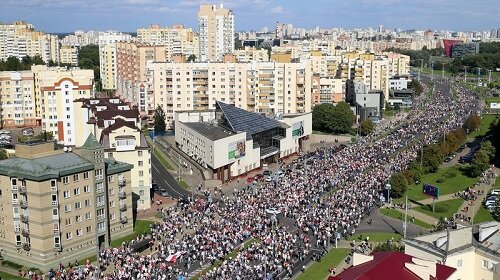Protests throughout Belarus the past few months
Last month, a series of major protests kicked off in the Eastern European nation of Belarus. These protests began in response to a contested (and very questionable) presidential election result. Now, the large-scale demonstrations and a general worker’s strike could end up removing Belarus’ president Alexander Lukashenko from power completely. So what exactly is going on in Belarus and what could that mean for the average American? This week, we’ll tell you everything you need to know about the situation in Belarus.
But First, Belarus: A Brief History
The modern history of Belarus has almost always been closely linked with that of its largest neighbor Russia. During the First and Second World Wars, the area now known as Belarus encountered significant destruction as both the Russian (later Soviet) and German armies fought on this territory. Much of Belarus was devastated during the Holocaust, and the Soviet Union quickly folded it into one of its most important “republics” during the Cold War. After independence in 1990, a man named Alexander Lukashenko won the presidency and has held that position ever since. Like Russian president Putin, he has maintained an authoritarian style of government that allows Lukashenko to essentially rule unchecked.
Belarus in the former Soviet Union
What’s happening now?
So what’s happening now? Belarus conducted presidential elections in early August. The main candidates were Lukashenko (obviously) and a young woman named Sviatlana Tsikhanouskaya. There were lots of really sketchy election-related events that occurred throughout the voting period, which has led to serious concerns about the integrity of the result. In addition, Lukashenko reported winning 80% of the vote, which also happens to be the same 80% he has reported to have won in nearly every election. After the government announced these results, hundreds of thousands of Belarusian citizens took to the streets to protest and called for a general strike. The leaders of this movement, who are predominantly women, have issued demands for the resignation of Lukashenko and his government, the release of political prisoners, and another presidential election without suspicious government interference.
The protests have remained mostly peaceful, but there are disturbing signs that Lukashenko’s government is not inclined to back down without a fight. In recent weeks, major protest figures have disappeared off the streets of the capital Minsk and presidential candidate Sviatlana Tsikhanouskaya was forced to flee the country. Lukashenko’s government has charged many of these leaders with crimes like “incitement to undermine national security.” He has also characterized the entire protest movement as a sinister plot by Western nations and NATO to undermine his government (similar to how Russia characterized the protests against Ukraine’s leader several years ago). Now, Lukashenko has made multiple direct overtures to Russian president Putin for assistance in ending these protests and becoming much more integrated with the Russian nation.
Opposition leader Sviatlana Tsikhanouskaya
What’s the big deal?
So why is this important? For decades, Belarus has been a close ally of Russia. In many ways, the fortunes of Belarus depend heavily on support from Russia. Russian president Putin has made no secret of his hatred for so-called color revolutions (these are revolutions against authoritarian governments that have taken place in countries throughout Eastern Europe), so these protests are certainly no exception. Putin is also paranoid that NATO might try to expand into Belarus and will look for any opportunity to prevent that. The situation could easily become another Ukrainian civil war with Russia deploying secret troops to put down the protests. What’s clear is that Belarus isn’t going to suddenly become democratic without a fight. However, the extent of potential violence remains unclear. We could see a long stalemate between the protests and government security forces as the regime tries to wait out the protestors (similar to how China has slowly tried to wait out the protests in Hong Kong). These protests have the potential to turn one of the least democratic nations in Eastern Europe into a more free and open society. Such a victory would be a significant blow to authoritarianism worldwide. It could also damage president Putin’s status at a time when his own situation is increasingly strained following the failed assassination attempt on his political opponent Alexei Navalny.
The NATO alliance has expanded closer to Russia since the Cold War.
What does this means for you?
This whole situation strikes directly at a critical ally of Russia, so Russia and president Lukashenko could do many terrible things to try to maintain control of Belarus (like assassinating internal dissidents, increasing foreign election interference, or shutting off oil pipelines to Europe). Such measures are extremely destabilizing to both the politics and the economies of the United States and its allies. Russia is a major petroleum producer and controls significant oil pipelines to much of Europe. Their actions could increase global oil prices and further depress a precarious global economy. But even beyond the economic impacts, the United States used to pride itself on standing up for democratic rights all over the world. There has been very little comment from American officials on these protests, let alone support for the democratic process in Belarus. America should stand up for peaceful democratic protests and push back against authoritarian dictators wherever possible. When we do not condemn actions like abducting political opponents abroad, how long can we prevent such conduct from occurring here at home?





